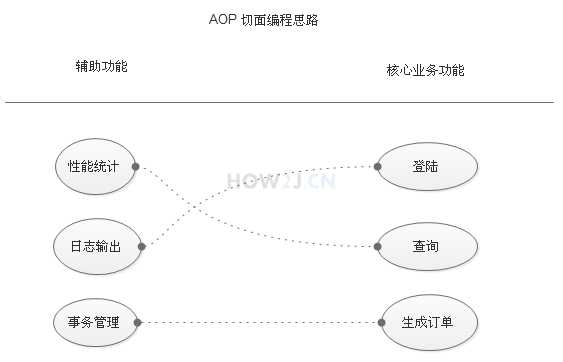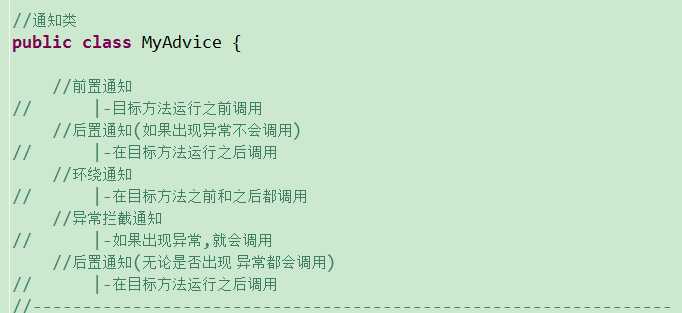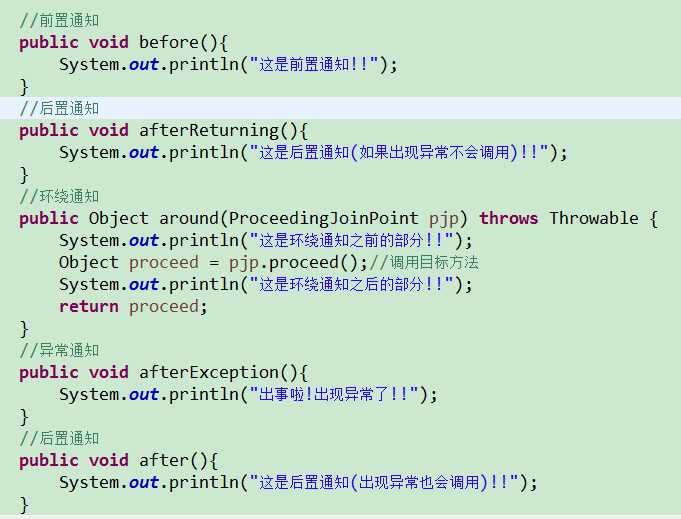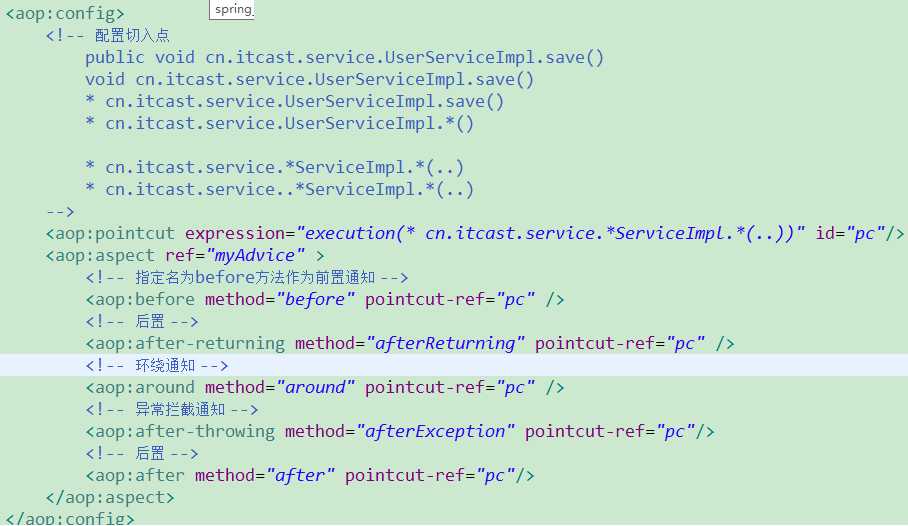标签:通知 ica 1.0 join control class dos soft exp
Spring是一个基于IOC和AOP的结构J2EE系统的框架
IOC 反转控制 是Spring的基础,Inversion Of Control
简单说就是创建对象由以前的程序员自己new 构造方法来调用,变成了交由Spring创建对象
DI 依赖注入 Dependency Inject. 简单地说就是拿到的对象的属性,已经被注入好相关值了,直接使用即可。
1.XML配置:
约束文档
PS xsd文件在jar包中,不必担心断网而无法使用的问题
<?xml version="1.0" encoding="UTF-8"?> <beans xmlns="http://www.springframework.org/schema/beans" xmlns:xsi="http://www.w3.org/2001/XMLSchema-instance" xmlns:aop="http://www.springframework.org/schema/aop" xmlns:tx="http://www.springframework.org/schema/tx" xmlns:context="http://www.springframework.org/schema/context" xsi:schemaLocation=" http://www.springframework.org/schema/beans http://www.springframework.org/schema/beans/spring-beans-3.0.xsd http://www.springframework.org/schema/aop http://www.springframework.org/schema/aop/spring-aop-3.0.xsd http://www.springframework.org/schema/tx http://www.springframework.org/schema/tx/spring-tx-3.0.xsd http://www.springframework.org/schema/context http://www.springframework.org/schema/context/spring-context-3.0.xsd"> </beans>
2.实体类注入:
(1)set方式:
<!-- scope="singleton" 单例模式 --> <bean name="c" class="pojo.Category" scope="singleton"> <!-- set方式注入 --> <!-- 注入属性 name:成员变量名 value:值 --> <property name="name" value="categoryFirst" /> </bean> <bean name="p" class="pojo.Product"> <property name="name" value="product 1" /> <!-- 属性值为对象时 注入一个对象 --> <property name="category" ref="c" /> </bean>
(2)构造器方式:
<bean name="car" class="pojo.Car"> <!-- 构造器注入 name:属性名 value:值 index:参数下标 type:数值类型 --> <constructor-arg name="name" value="奔驰" index="0"></constructor-arg> <constructor-arg name="color" value="银色" index="1"></constructor-arg> <constructor-arg name="wheels" value="4" index="2" type="java.lang.Integer"></constructor-arg> </bean>
(3)复杂类型注入:
<!-- 复杂类型注入 --> <bean name="demo" class="pojo.Demo"> <property name="arr"> <array> <value>1</value> <ref bean="car"/> </array> </property> <property name="list"> <list> <value>2</value> <ref bean="c"/> </list> </property> <property name="map"> <map> <entry key="一号" value="1"></entry> <entry key="二号" value-ref="car"></entry> <entry key-ref="car" value-ref="car"></entry> </map> </property> <property name="pro"> <props> <prop key="driver">com.mysql.jdbc.Driver</prop> <prop key="user">root</prop> <prop key="pwd">123456</prop> </props> </property> </bean>
3.注解方式:
(1)注解方式注入对象:
添加:<context:annotation-config/>,表示告诉Spring要用注解的方式进行配置
原来的<property name="category" ref="c" />去掉
<context:annotation-config/> <bean name="c" class="pojo.Category" scope="singleton"> <property name="name" value="categoryFirst" /> </bean> <bean name="p" class="pojo.Product"> <property name="name" value="product 1" /> </bean>
两种方式:Autowired/Resource,任选其一
Autowired可在set方法上进行注解,如果有多个对象,则@Qualifier(value = "plane")指定对象名
@Resource(name="")可以指定对象名
@Autowired @Resource(name="c") private Category category;
(2)注解为bean类:
XML内只添加
<context:component-scan base-package="pojo"/>
<?xml version="1.0" encoding="UTF-8"?> <beans xmlns="http://www.springframework.org/schema/beans" xmlns:xsi="http://www.w3.org/2001/XMLSchema-instance" xmlns:aop="http://www.springframework.org/schema/aop" xmlns:tx="http://www.springframework.org/schema/tx" xmlns:context="http://www.springframework.org/schema/context" xsi:schemaLocation=" http://www.springframework.org/schema/beans http://www.springframework.org/schema/beans/spring-beans-3.0.xsd http://www.springframework.org/schema/aop http://www.springframework.org/schema/aop/spring-aop-3.0.xsd http://www.springframework.org/schema/tx http://www.springframework.org/schema/tx/spring-tx-3.0.xsd http://www.springframework.org/schema/context http://www.springframework.org/schema/context/spring-context-3.0.xsd"> <context:component-scan base-package="pojo"/> </beans>
其作用是告诉Spring,bean都放在pojo这个包下
为Product类加上@Component注解,即表明此类是bean
为Category 类加上@Component注解,即表明此类是bean
@Repository 用于对DAO实现类进行标注(dao层)
@Service 用于对Service实现类进行标注(service层)
@Controller 用于对Controller实现类进行标注(web层)
public class Car { private String name; private String color; private Integer wheels; public Car() { super(); } public Car(String name, String color, Integer wheels) { super(); this.name = name; this.color = color; this.wheels = wheels; } public String getName() { return name; } @Value("奔驰") public void setName(String name) { this.name = name; } public String getColor() { return color; } @Value("银色") public void setColor(String color) { this.color = color; } public Integer getWheels() { return wheels; } @Value("4") public void setWheels(Integer wheels) { this.wheels = wheels; } }
4.获取实体类
public class TestSpring { public static void main(String[] args) { ApplicationContext context = new ClassPathXmlApplicationContext("applicationContext.xml"); Category c = (Category) context.getBean("c"); System.out.println(c.getName()); Product p = (Product)context.getBean("p"); System.out.println(p.getName()); System.out.println(p.getCategory().getName()); } }
5.AOP
AOP 即 Aspect Oriented Program 面向切面编程
首先,在面向切面编程的思想里面,把功能分为核心业务功能,和周边功能。
(1)所谓的核心业务,比如登陆,增加数据,删除数据都叫核心业务
(2)所谓的周边功能,比如性能统计,日志,事务管理等等
周边功能在Spring的面向切面编程AOP思想里,即被定义为切面
在面向切面编程AOP的思想里面,核心业务功能和切面功能分别独立进行开发
然后把切面功能和核心业务功能 "编织" 在一起,这就叫AOP

(1)日志辅助功能(日志切面)
public class LoggerAspect {public Object log(ProceedingJoinPoint joinPoint) throws Throwable{//ProceedingJoinPoint 环绕通知 System.out.println("start log:"+joinPoint.getSignature().getName()); Object object = joinPoint.proceed(); System.out.println("end log:"+joinPoint.getSignature().getName()); return object; } }
除环绕通知外,还有前置通知、后置通知、异常通知


(2)业务类
public class ProductService { public void doSomeService() { System.out.println("doSomeService"); } }
(3)XML配置
<!--业务对象--> <bean name="s" class="service.ProductService"></bean> <!--日志切面对象--> <bean id="loggerAspect" class="service.LoggerAspect"/> <aop:config> <!--指定核心业务功能--> <aop:pointcut id="loggerCutpoint" <!--这表示对满足如下条件的方法调用,进行切面操作: * 返回任意类型 service.ProductService.* 包名以 service.ProductService 开头的类的任意方法 (..) 参数是任意数量和类型--> expression= "execution(* service.ProductService.*(..)) "/> <!--指定辅助功能--> <aop:aspect id="logAspect" ref="loggerAspect"> <!--将两个功能编制在一起--> <aop:around pointcut-ref="loggerCutpoint" method="log"/> </aop:aspect> </aop:config>

标签:通知 ica 1.0 join control class dos soft exp
原文地址:https://www.cnblogs.com/whwjava/p/9159624.html